Qualitative Research Methods: Ethical Issues in Social Science
VerifiedAdded on 2022/08/22
|9
|2133
|12
Report
AI Summary
This report examines the ethical implications of conducting a survey on classmates' attitudes toward unprotected sexual behaviors. It emphasizes the importance of ethical considerations to ensure respondent protection and respect for human dignity, as mandated by the Tri-Council Policy. The report discusses key ethical principles, including respect for persons, concern for welfare, and justice, highlighting the need for informed consent, anonymity, and confidentiality. It addresses potential risks, such as the sensitivity of the topic, and emphasizes the researcher's responsibility to minimize harm and ensure participants' right to withdraw. The report also explores research methods, validity, and the avoidance of deceptive practices. Ultimately, it concludes that incorporating ethical implications is vital for protecting participants' rights, facilitating the research process, and adhering to established guidelines. The report also stresses the importance of using appropriate research methods and applying the Tri-Council policy correctly.
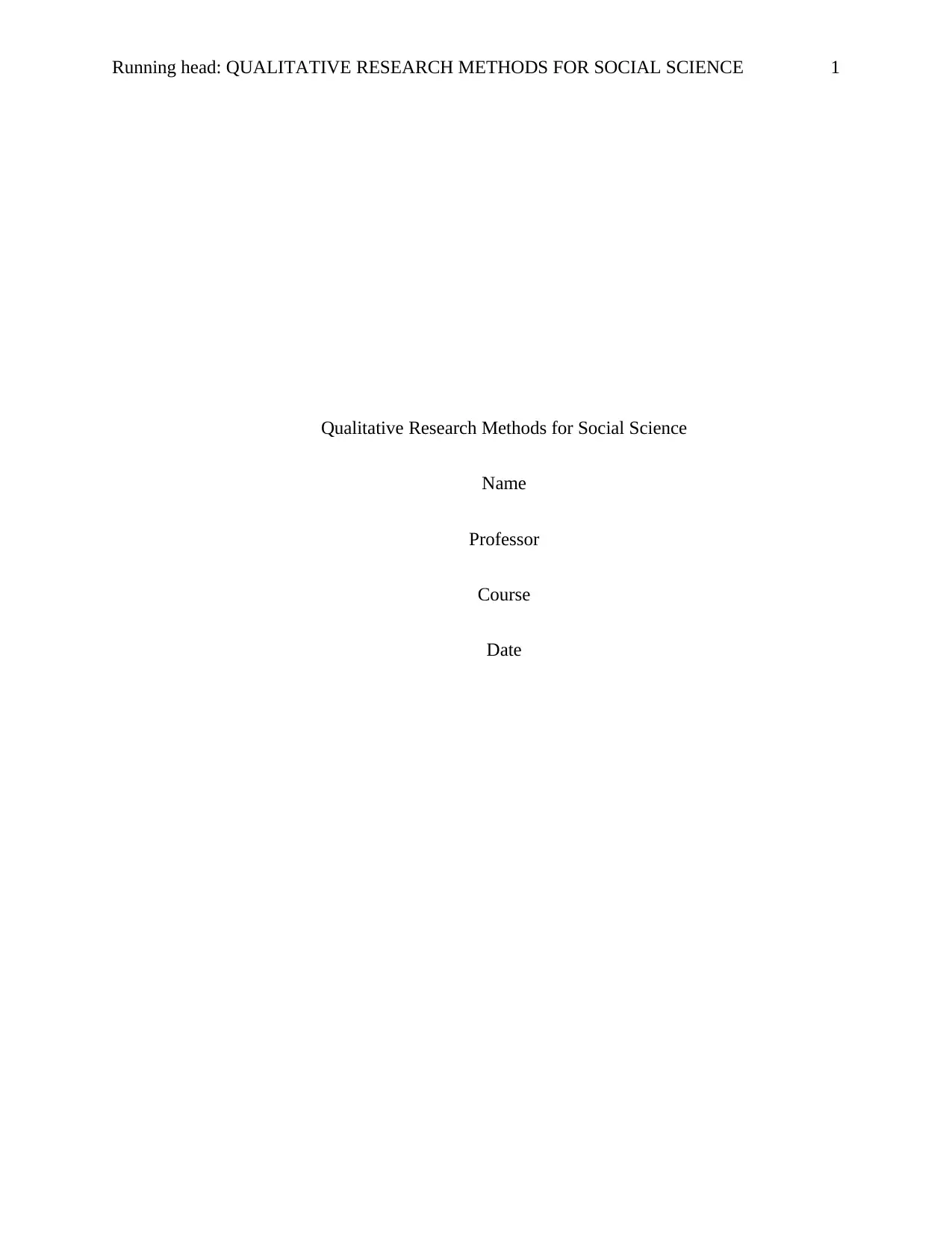
Running head: QUALITATIVE RESEARCH METHODS FOR SOCIAL SCIENCE 1
Qualitative Research Methods for Social Science
Name
Professor
Course
Date
Qualitative Research Methods for Social Science
Name
Professor
Course
Date
Paraphrase This Document
Need a fresh take? Get an instant paraphrase of this document with our AI Paraphraser
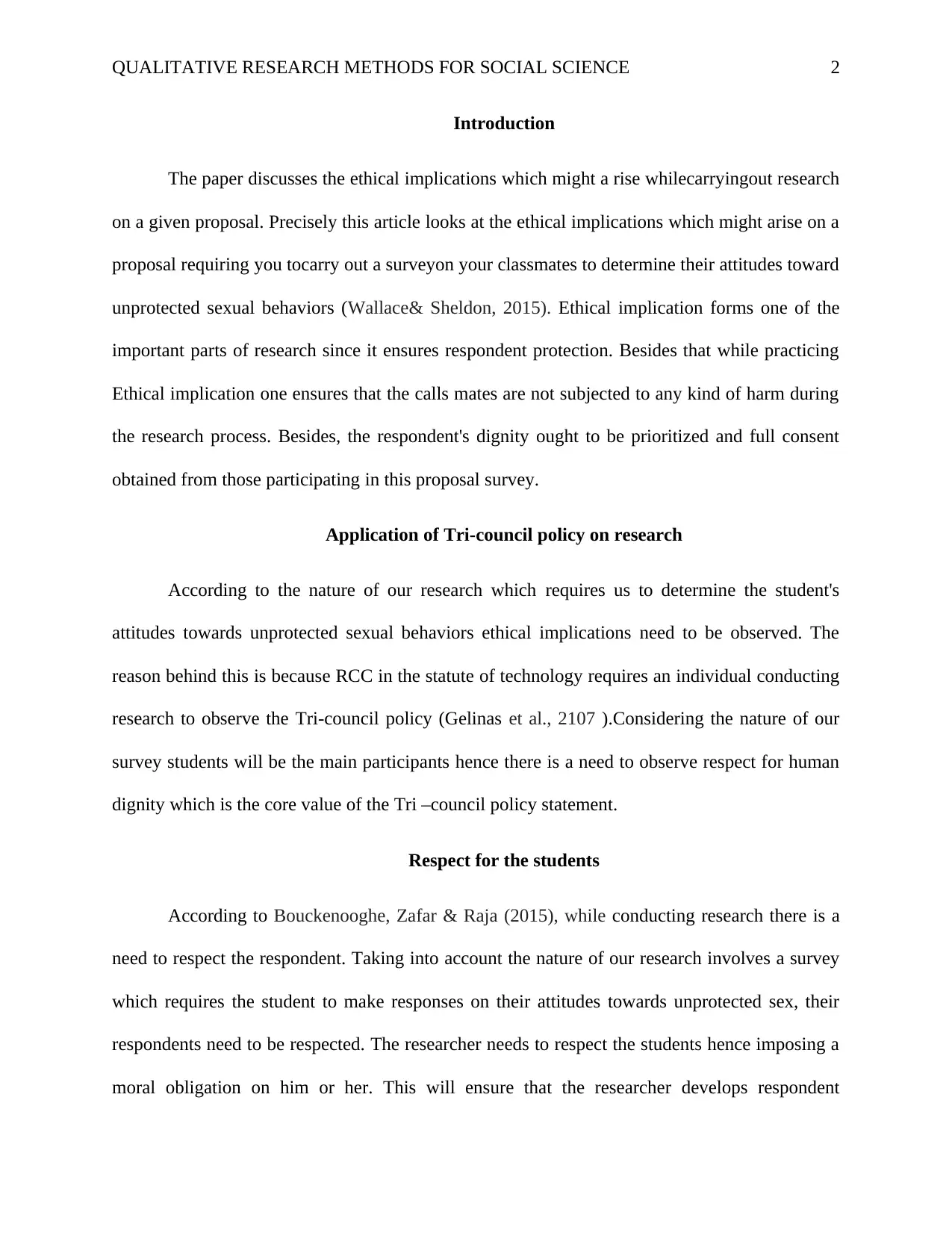
QUALITATIVE RESEARCH METHODS FOR SOCIAL SCIENCE 2
Introduction
The paper discusses the ethical implications which might a rise whilecarryingout research
on a given proposal. Precisely this article looks at the ethical implications which might arise on a
proposal requiring you tocarry out a surveyon your classmates to determine their attitudes toward
unprotected sexual behaviors (Wallace& Sheldon, 2015). Ethical implication forms one of the
important parts of research since it ensures respondent protection. Besides that while practicing
Ethical implication one ensures that the calls mates are not subjected to any kind of harm during
the research process. Besides, the respondent's dignity ought to be prioritized and full consent
obtained from those participating in this proposal survey.
Application of Tri-council policy on research
According to the nature of our research which requires us to determine the student's
attitudes towards unprotected sexual behaviors ethical implications need to be observed. The
reason behind this is because RCC in the statute of technology requires an individual conducting
research to observe the Tri-council policy (Gelinas et al., 2107 ).Considering the nature of our
survey students will be the main participants hence there is a need to observe respect for human
dignity which is the core value of the Tri –council policy statement.
Respect for the students
According to Bouckenooghe, Zafar & Raja (2015), while conducting research there is a
need to respect the respondent. Taking into account the nature of our research involves a survey
which requires the student to make responses on their attitudes towards unprotected sex, their
respondents need to be respected. The researcher needs to respect the students hence imposing a
moral obligation on him or her. This will ensure that the researcher develops respondent
Introduction
The paper discusses the ethical implications which might a rise whilecarryingout research
on a given proposal. Precisely this article looks at the ethical implications which might arise on a
proposal requiring you tocarry out a surveyon your classmates to determine their attitudes toward
unprotected sexual behaviors (Wallace& Sheldon, 2015). Ethical implication forms one of the
important parts of research since it ensures respondent protection. Besides that while practicing
Ethical implication one ensures that the calls mates are not subjected to any kind of harm during
the research process. Besides, the respondent's dignity ought to be prioritized and full consent
obtained from those participating in this proposal survey.
Application of Tri-council policy on research
According to the nature of our research which requires us to determine the student's
attitudes towards unprotected sexual behaviors ethical implications need to be observed. The
reason behind this is because RCC in the statute of technology requires an individual conducting
research to observe the Tri-council policy (Gelinas et al., 2107 ).Considering the nature of our
survey students will be the main participants hence there is a need to observe respect for human
dignity which is the core value of the Tri –council policy statement.
Respect for the students
According to Bouckenooghe, Zafar & Raja (2015), while conducting research there is a
need to respect the respondent. Taking into account the nature of our research involves a survey
which requires the student to make responses on their attitudes towards unprotected sex, their
respondents need to be respected. The researcher needs to respect the students hence imposing a
moral obligation on him or her. This will ensure that the researcher develops respondent
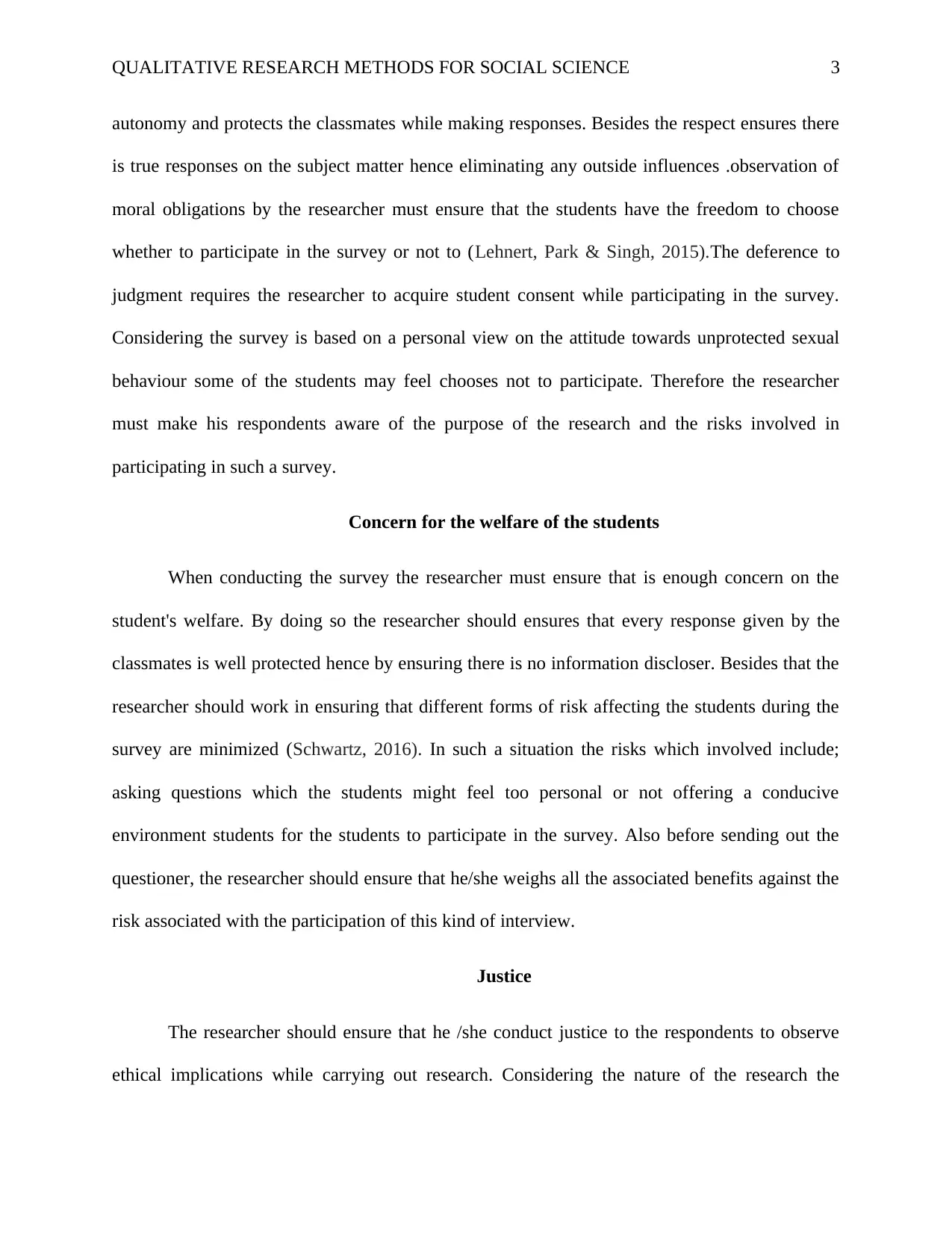
QUALITATIVE RESEARCH METHODS FOR SOCIAL SCIENCE 3
autonomy and protects the classmates while making responses. Besides the respect ensures there
is true responses on the subject matter hence eliminating any outside influences .observation of
moral obligations by the researcher must ensure that the students have the freedom to choose
whether to participate in the survey or not to (Lehnert, Park & Singh, 2015).The deference to
judgment requires the researcher to acquire student consent while participating in the survey.
Considering the survey is based on a personal view on the attitude towards unprotected sexual
behaviour some of the students may feel chooses not to participate. Therefore the researcher
must make his respondents aware of the purpose of the research and the risks involved in
participating in such a survey.
Concern for the welfare of the students
When conducting the survey the researcher must ensure that is enough concern on the
student's welfare. By doing so the researcher should ensures that every response given by the
classmates is well protected hence by ensuring there is no information discloser. Besides that the
researcher should work in ensuring that different forms of risk affecting the students during the
survey are minimized (Schwartz, 2016). In such a situation the risks which involved include;
asking questions which the students might feel too personal or not offering a conducive
environment students for the students to participate in the survey. Also before sending out the
questioner, the researcher should ensure that he/she weighs all the associated benefits against the
risk associated with the participation of this kind of interview.
Justice
The researcher should ensure that he /she conduct justice to the respondents to observe
ethical implications while carrying out research. Considering the nature of the research the
autonomy and protects the classmates while making responses. Besides the respect ensures there
is true responses on the subject matter hence eliminating any outside influences .observation of
moral obligations by the researcher must ensure that the students have the freedom to choose
whether to participate in the survey or not to (Lehnert, Park & Singh, 2015).The deference to
judgment requires the researcher to acquire student consent while participating in the survey.
Considering the survey is based on a personal view on the attitude towards unprotected sexual
behaviour some of the students may feel chooses not to participate. Therefore the researcher
must make his respondents aware of the purpose of the research and the risks involved in
participating in such a survey.
Concern for the welfare of the students
When conducting the survey the researcher must ensure that is enough concern on the
student's welfare. By doing so the researcher should ensures that every response given by the
classmates is well protected hence by ensuring there is no information discloser. Besides that the
researcher should work in ensuring that different forms of risk affecting the students during the
survey are minimized (Schwartz, 2016). In such a situation the risks which involved include;
asking questions which the students might feel too personal or not offering a conducive
environment students for the students to participate in the survey. Also before sending out the
questioner, the researcher should ensure that he/she weighs all the associated benefits against the
risk associated with the participation of this kind of interview.
Justice
The researcher should ensure that he /she conduct justice to the respondents to observe
ethical implications while carrying out research. Considering the nature of the research the
⊘ This is a preview!⊘
Do you want full access?
Subscribe today to unlock all pages.

Trusted by 1+ million students worldwide
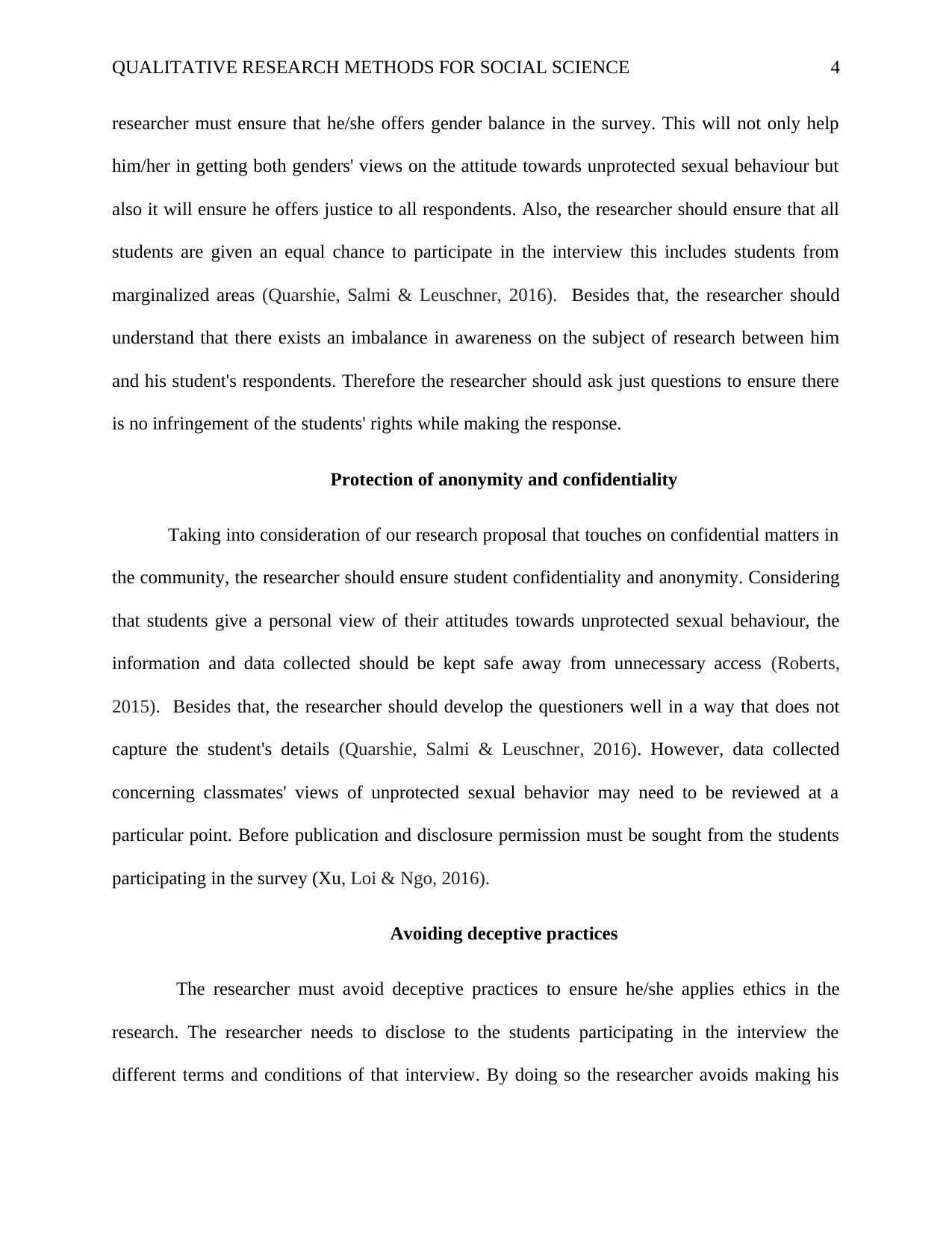
QUALITATIVE RESEARCH METHODS FOR SOCIAL SCIENCE 4
researcher must ensure that he/she offers gender balance in the survey. This will not only help
him/her in getting both genders' views on the attitude towards unprotected sexual behaviour but
also it will ensure he offers justice to all respondents. Also, the researcher should ensure that all
students are given an equal chance to participate in the interview this includes students from
marginalized areas (Quarshie, Salmi & Leuschner, 2016). Besides that, the researcher should
understand that there exists an imbalance in awareness on the subject of research between him
and his student's respondents. Therefore the researcher should ask just questions to ensure there
is no infringement of the students' rights while making the response.
Protection of anonymity and confidentiality
Taking into consideration of our research proposal that touches on confidential matters in
the community, the researcher should ensure student confidentiality and anonymity. Considering
that students give a personal view of their attitudes towards unprotected sexual behaviour, the
information and data collected should be kept safe away from unnecessary access (Roberts,
2015). Besides that, the researcher should develop the questioners well in a way that does not
capture the student's details (Quarshie, Salmi & Leuschner, 2016). However, data collected
concerning classmates' views of unprotected sexual behavior may need to be reviewed at a
particular point. Before publication and disclosure permission must be sought from the students
participating in the survey (Xu, Loi & Ngo, 2016).
Avoiding deceptive practices
The researcher must avoid deceptive practices to ensure he/she applies ethics in the
research. The researcher needs to disclose to the students participating in the interview the
different terms and conditions of that interview. By doing so the researcher avoids making his
researcher must ensure that he/she offers gender balance in the survey. This will not only help
him/her in getting both genders' views on the attitude towards unprotected sexual behaviour but
also it will ensure he offers justice to all respondents. Also, the researcher should ensure that all
students are given an equal chance to participate in the interview this includes students from
marginalized areas (Quarshie, Salmi & Leuschner, 2016). Besides that, the researcher should
understand that there exists an imbalance in awareness on the subject of research between him
and his student's respondents. Therefore the researcher should ask just questions to ensure there
is no infringement of the students' rights while making the response.
Protection of anonymity and confidentiality
Taking into consideration of our research proposal that touches on confidential matters in
the community, the researcher should ensure student confidentiality and anonymity. Considering
that students give a personal view of their attitudes towards unprotected sexual behaviour, the
information and data collected should be kept safe away from unnecessary access (Roberts,
2015). Besides that, the researcher should develop the questioners well in a way that does not
capture the student's details (Quarshie, Salmi & Leuschner, 2016). However, data collected
concerning classmates' views of unprotected sexual behavior may need to be reviewed at a
particular point. Before publication and disclosure permission must be sought from the students
participating in the survey (Xu, Loi & Ngo, 2016).
Avoiding deceptive practices
The researcher must avoid deceptive practices to ensure he/she applies ethics in the
research. The researcher needs to disclose to the students participating in the interview the
different terms and conditions of that interview. By doing so the researcher avoids making his
Paraphrase This Document
Need a fresh take? Get an instant paraphrase of this document with our AI Paraphraser
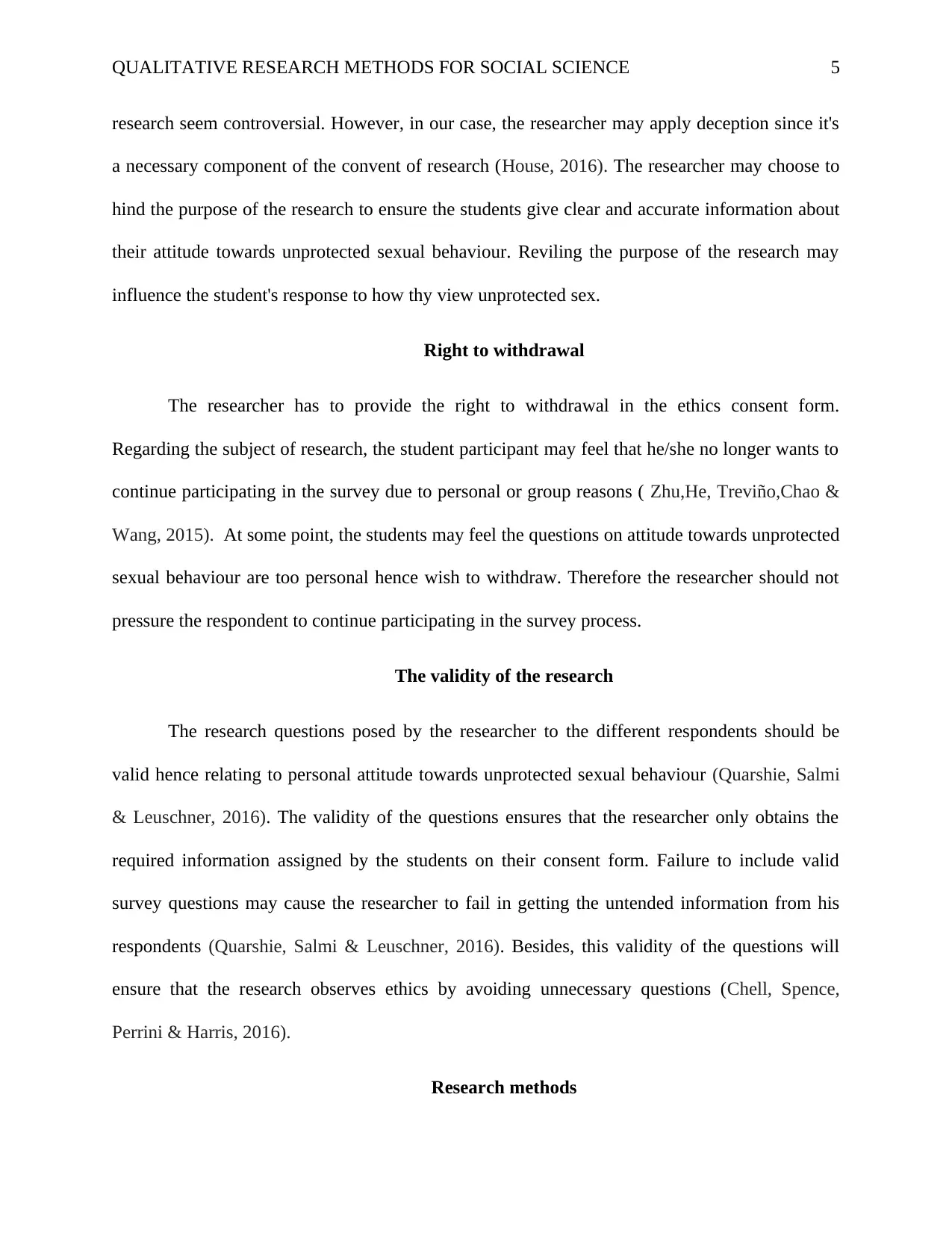
QUALITATIVE RESEARCH METHODS FOR SOCIAL SCIENCE 5
research seem controversial. However, in our case, the researcher may apply deception since it's
a necessary component of the convent of research (House, 2016). The researcher may choose to
hind the purpose of the research to ensure the students give clear and accurate information about
their attitude towards unprotected sexual behaviour. Reviling the purpose of the research may
influence the student's response to how thy view unprotected sex.
Right to withdrawal
The researcher has to provide the right to withdrawal in the ethics consent form.
Regarding the subject of research, the student participant may feel that he/she no longer wants to
continue participating in the survey due to personal or group reasons ( Zhu,He, Treviño,Chao &
Wang, 2015). At some point, the students may feel the questions on attitude towards unprotected
sexual behaviour are too personal hence wish to withdraw. Therefore the researcher should not
pressure the respondent to continue participating in the survey process.
The validity of the research
The research questions posed by the researcher to the different respondents should be
valid hence relating to personal attitude towards unprotected sexual behaviour (Quarshie, Salmi
& Leuschner, 2016). The validity of the questions ensures that the researcher only obtains the
required information assigned by the students on their consent form. Failure to include valid
survey questions may cause the researcher to fail in getting the untended information from his
respondents (Quarshie, Salmi & Leuschner, 2016). Besides, this validity of the questions will
ensure that the research observes ethics by avoiding unnecessary questions (Chell, Spence,
Perrini & Harris, 2016).
Research methods
research seem controversial. However, in our case, the researcher may apply deception since it's
a necessary component of the convent of research (House, 2016). The researcher may choose to
hind the purpose of the research to ensure the students give clear and accurate information about
their attitude towards unprotected sexual behaviour. Reviling the purpose of the research may
influence the student's response to how thy view unprotected sex.
Right to withdrawal
The researcher has to provide the right to withdrawal in the ethics consent form.
Regarding the subject of research, the student participant may feel that he/she no longer wants to
continue participating in the survey due to personal or group reasons ( Zhu,He, Treviño,Chao &
Wang, 2015). At some point, the students may feel the questions on attitude towards unprotected
sexual behaviour are too personal hence wish to withdraw. Therefore the researcher should not
pressure the respondent to continue participating in the survey process.
The validity of the research
The research questions posed by the researcher to the different respondents should be
valid hence relating to personal attitude towards unprotected sexual behaviour (Quarshie, Salmi
& Leuschner, 2016). The validity of the questions ensures that the researcher only obtains the
required information assigned by the students on their consent form. Failure to include valid
survey questions may cause the researcher to fail in getting the untended information from his
respondents (Quarshie, Salmi & Leuschner, 2016). Besides, this validity of the questions will
ensure that the research observes ethics by avoiding unnecessary questions (Chell, Spence,
Perrini & Harris, 2016).
Research methods
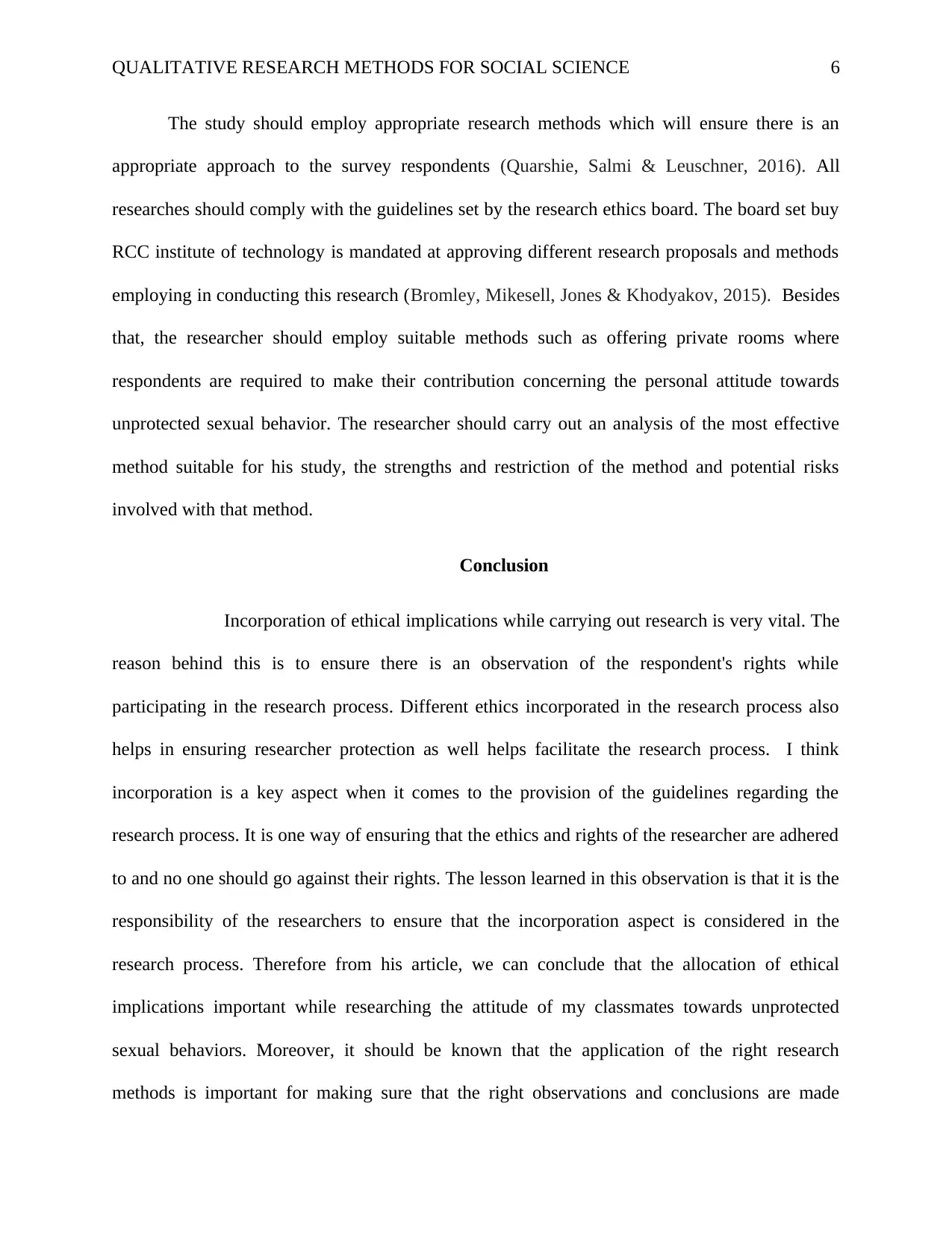
QUALITATIVE RESEARCH METHODS FOR SOCIAL SCIENCE 6
The study should employ appropriate research methods which will ensure there is an
appropriate approach to the survey respondents (Quarshie, Salmi & Leuschner, 2016). All
researches should comply with the guidelines set by the research ethics board. The board set buy
RCC institute of technology is mandated at approving different research proposals and methods
employing in conducting this research (Bromley, Mikesell, Jones & Khodyakov, 2015). Besides
that, the researcher should employ suitable methods such as offering private rooms where
respondents are required to make their contribution concerning the personal attitude towards
unprotected sexual behavior. The researcher should carry out an analysis of the most effective
method suitable for his study, the strengths and restriction of the method and potential risks
involved with that method.
Conclusion
Incorporation of ethical implications while carrying out research is very vital. The
reason behind this is to ensure there is an observation of the respondent's rights while
participating in the research process. Different ethics incorporated in the research process also
helps in ensuring researcher protection as well helps facilitate the research process. I think
incorporation is a key aspect when it comes to the provision of the guidelines regarding the
research process. It is one way of ensuring that the ethics and rights of the researcher are adhered
to and no one should go against their rights. The lesson learned in this observation is that it is the
responsibility of the researchers to ensure that the incorporation aspect is considered in the
research process. Therefore from his article, we can conclude that the allocation of ethical
implications important while researching the attitude of my classmates towards unprotected
sexual behaviors. Moreover, it should be known that the application of the right research
methods is important for making sure that the right observations and conclusions are made
The study should employ appropriate research methods which will ensure there is an
appropriate approach to the survey respondents (Quarshie, Salmi & Leuschner, 2016). All
researches should comply with the guidelines set by the research ethics board. The board set buy
RCC institute of technology is mandated at approving different research proposals and methods
employing in conducting this research (Bromley, Mikesell, Jones & Khodyakov, 2015). Besides
that, the researcher should employ suitable methods such as offering private rooms where
respondents are required to make their contribution concerning the personal attitude towards
unprotected sexual behavior. The researcher should carry out an analysis of the most effective
method suitable for his study, the strengths and restriction of the method and potential risks
involved with that method.
Conclusion
Incorporation of ethical implications while carrying out research is very vital. The
reason behind this is to ensure there is an observation of the respondent's rights while
participating in the research process. Different ethics incorporated in the research process also
helps in ensuring researcher protection as well helps facilitate the research process. I think
incorporation is a key aspect when it comes to the provision of the guidelines regarding the
research process. It is one way of ensuring that the ethics and rights of the researcher are adhered
to and no one should go against their rights. The lesson learned in this observation is that it is the
responsibility of the researchers to ensure that the incorporation aspect is considered in the
research process. Therefore from his article, we can conclude that the allocation of ethical
implications important while researching the attitude of my classmates towards unprotected
sexual behaviors. Moreover, it should be known that the application of the right research
methods is important for making sure that the right observations and conclusions are made
⊘ This is a preview!⊘
Do you want full access?
Subscribe today to unlock all pages.

Trusted by 1+ million students worldwide
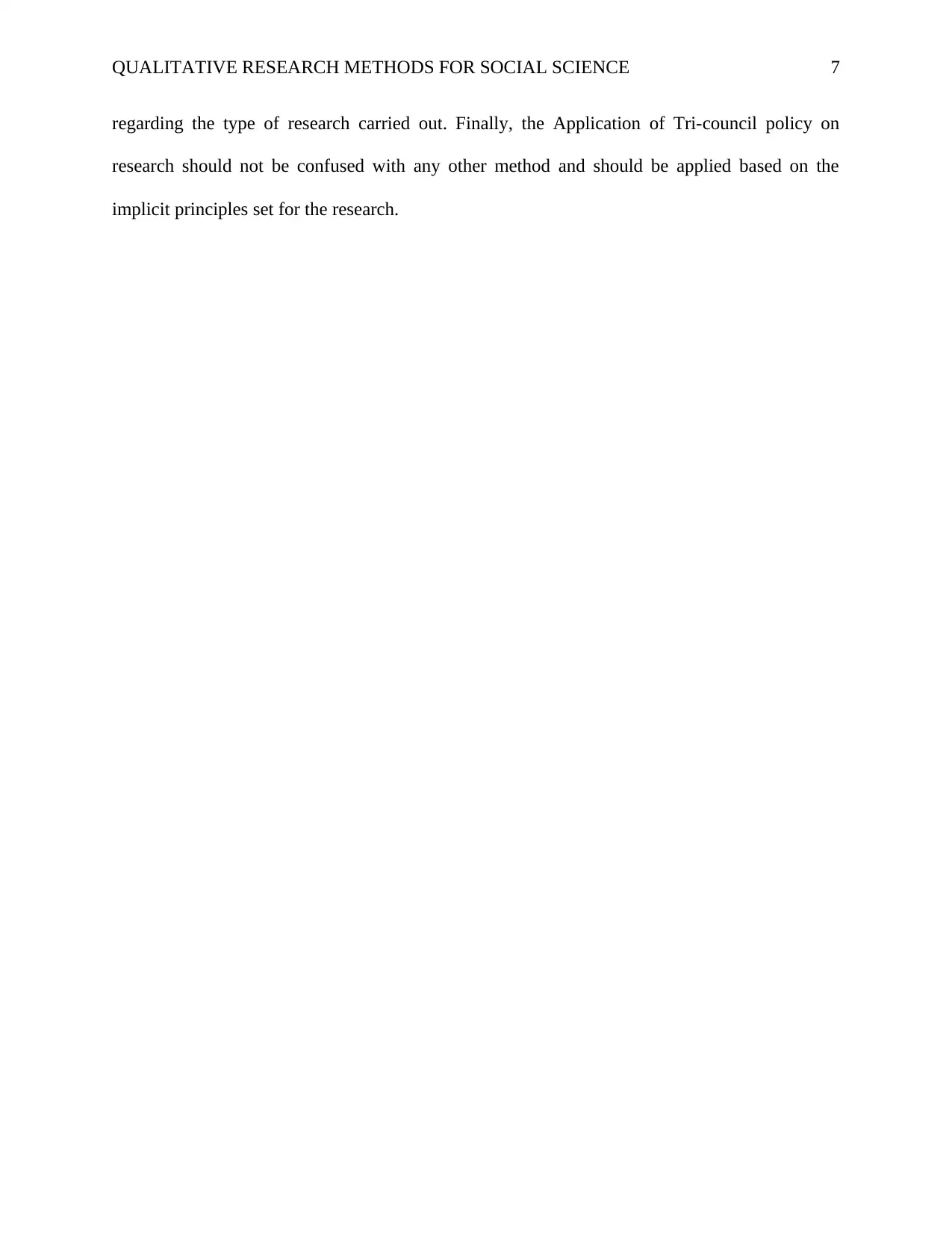
QUALITATIVE RESEARCH METHODS FOR SOCIAL SCIENCE 7
regarding the type of research carried out. Finally, the Application of Tri-council policy on
research should not be confused with any other method and should be applied based on the
implicit principles set for the research.
regarding the type of research carried out. Finally, the Application of Tri-council policy on
research should not be confused with any other method and should be applied based on the
implicit principles set for the research.
Paraphrase This Document
Need a fresh take? Get an instant paraphrase of this document with our AI Paraphraser
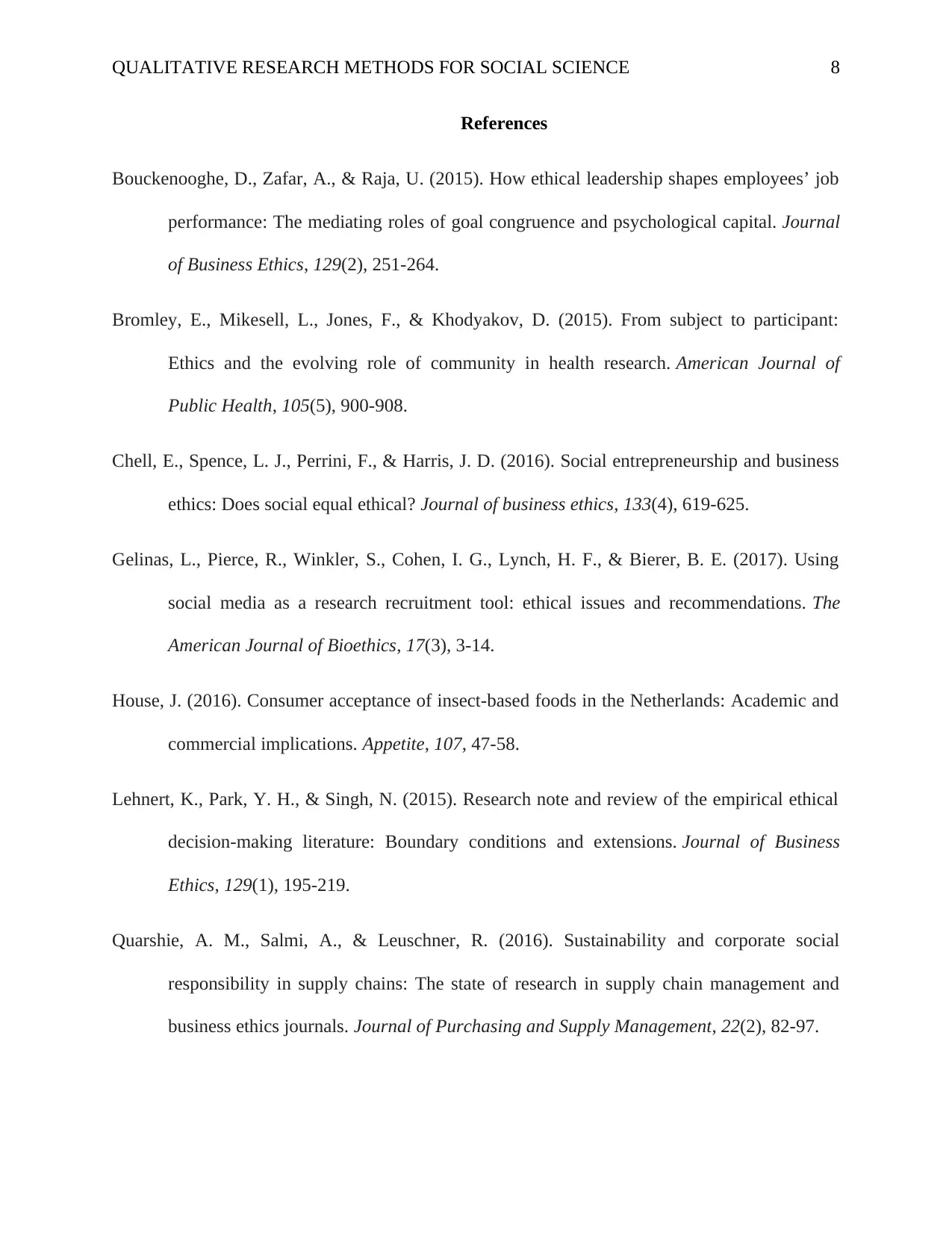
QUALITATIVE RESEARCH METHODS FOR SOCIAL SCIENCE 8
References
Bouckenooghe, D., Zafar, A., & Raja, U. (2015). How ethical leadership shapes employees’ job
performance: The mediating roles of goal congruence and psychological capital. Journal
of Business Ethics, 129(2), 251-264.
Bromley, E., Mikesell, L., Jones, F., & Khodyakov, D. (2015). From subject to participant:
Ethics and the evolving role of community in health research. American Journal of
Public Health, 105(5), 900-908.
Chell, E., Spence, L. J., Perrini, F., & Harris, J. D. (2016). Social entrepreneurship and business
ethics: Does social equal ethical? Journal of business ethics, 133(4), 619-625.
Gelinas, L., Pierce, R., Winkler, S., Cohen, I. G., Lynch, H. F., & Bierer, B. E. (2017). Using
social media as a research recruitment tool: ethical issues and recommendations. The
American Journal of Bioethics, 17(3), 3-14.
House, J. (2016). Consumer acceptance of insect-based foods in the Netherlands: Academic and
commercial implications. Appetite, 107, 47-58.
Lehnert, K., Park, Y. H., & Singh, N. (2015). Research note and review of the empirical ethical
decision-making literature: Boundary conditions and extensions. Journal of Business
Ethics, 129(1), 195-219.
Quarshie, A. M., Salmi, A., & Leuschner, R. (2016). Sustainability and corporate social
responsibility in supply chains: The state of research in supply chain management and
business ethics journals. Journal of Purchasing and Supply Management, 22(2), 82-97.
References
Bouckenooghe, D., Zafar, A., & Raja, U. (2015). How ethical leadership shapes employees’ job
performance: The mediating roles of goal congruence and psychological capital. Journal
of Business Ethics, 129(2), 251-264.
Bromley, E., Mikesell, L., Jones, F., & Khodyakov, D. (2015). From subject to participant:
Ethics and the evolving role of community in health research. American Journal of
Public Health, 105(5), 900-908.
Chell, E., Spence, L. J., Perrini, F., & Harris, J. D. (2016). Social entrepreneurship and business
ethics: Does social equal ethical? Journal of business ethics, 133(4), 619-625.
Gelinas, L., Pierce, R., Winkler, S., Cohen, I. G., Lynch, H. F., & Bierer, B. E. (2017). Using
social media as a research recruitment tool: ethical issues and recommendations. The
American Journal of Bioethics, 17(3), 3-14.
House, J. (2016). Consumer acceptance of insect-based foods in the Netherlands: Academic and
commercial implications. Appetite, 107, 47-58.
Lehnert, K., Park, Y. H., & Singh, N. (2015). Research note and review of the empirical ethical
decision-making literature: Boundary conditions and extensions. Journal of Business
Ethics, 129(1), 195-219.
Quarshie, A. M., Salmi, A., & Leuschner, R. (2016). Sustainability and corporate social
responsibility in supply chains: The state of research in supply chain management and
business ethics journals. Journal of Purchasing and Supply Management, 22(2), 82-97.
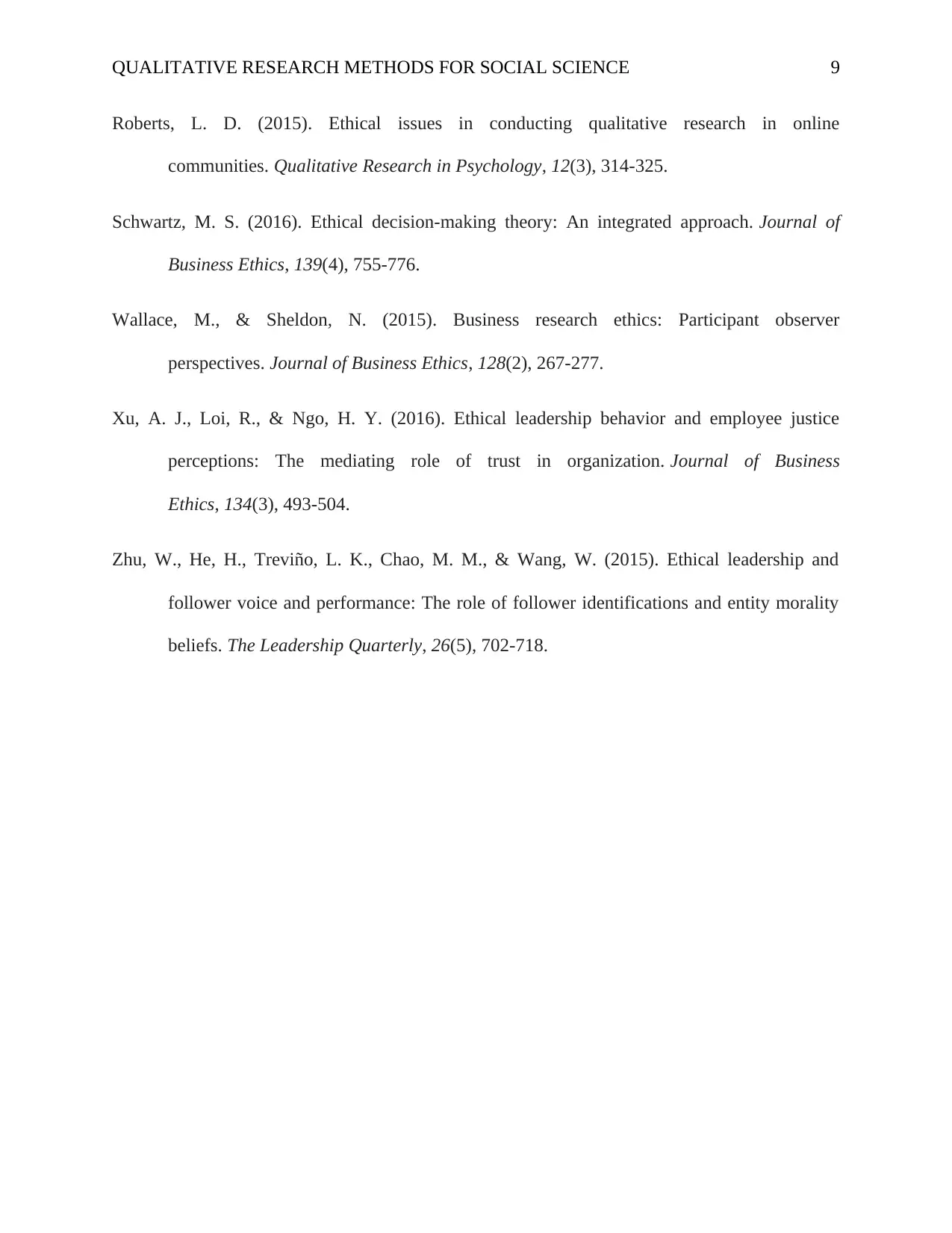
QUALITATIVE RESEARCH METHODS FOR SOCIAL SCIENCE 9
Roberts, L. D. (2015). Ethical issues in conducting qualitative research in online
communities. Qualitative Research in Psychology, 12(3), 314-325.
Schwartz, M. S. (2016). Ethical decision-making theory: An integrated approach. Journal of
Business Ethics, 139(4), 755-776.
Wallace, M., & Sheldon, N. (2015). Business research ethics: Participant observer
perspectives. Journal of Business Ethics, 128(2), 267-277.
Xu, A. J., Loi, R., & Ngo, H. Y. (2016). Ethical leadership behavior and employee justice
perceptions: The mediating role of trust in organization. Journal of Business
Ethics, 134(3), 493-504.
Zhu, W., He, H., Treviño, L. K., Chao, M. M., & Wang, W. (2015). Ethical leadership and
follower voice and performance: The role of follower identifications and entity morality
beliefs. The Leadership Quarterly, 26(5), 702-718.
Roberts, L. D. (2015). Ethical issues in conducting qualitative research in online
communities. Qualitative Research in Psychology, 12(3), 314-325.
Schwartz, M. S. (2016). Ethical decision-making theory: An integrated approach. Journal of
Business Ethics, 139(4), 755-776.
Wallace, M., & Sheldon, N. (2015). Business research ethics: Participant observer
perspectives. Journal of Business Ethics, 128(2), 267-277.
Xu, A. J., Loi, R., & Ngo, H. Y. (2016). Ethical leadership behavior and employee justice
perceptions: The mediating role of trust in organization. Journal of Business
Ethics, 134(3), 493-504.
Zhu, W., He, H., Treviño, L. K., Chao, M. M., & Wang, W. (2015). Ethical leadership and
follower voice and performance: The role of follower identifications and entity morality
beliefs. The Leadership Quarterly, 26(5), 702-718.
⊘ This is a preview!⊘
Do you want full access?
Subscribe today to unlock all pages.

Trusted by 1+ million students worldwide
1 out of 9
Your All-in-One AI-Powered Toolkit for Academic Success.
+13062052269
info@desklib.com
Available 24*7 on WhatsApp / Email
![[object Object]](/_next/static/media/star-bottom.7253800d.svg)
Unlock your academic potential
Copyright © 2020–2026 A2Z Services. All Rights Reserved. Developed and managed by ZUCOL.

